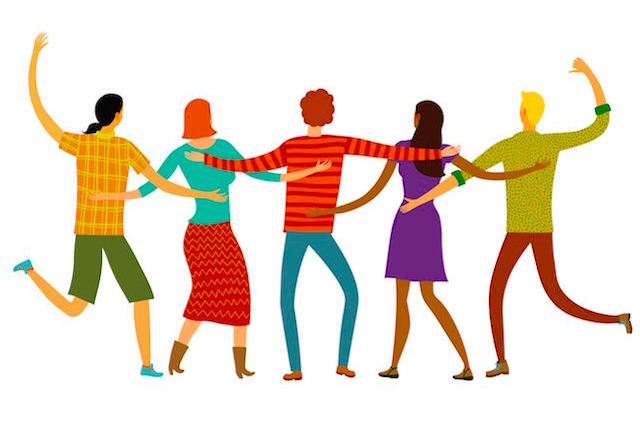
“To have a friend and be a friend is what makes life worthwhile.” ~Unknown
Studies show that perhaps the most important component of psychological well-being is not family, material possessions, or career successes, but rather our friendships.
For someone like me, that is terrifying news.
I have few friends. There are several reasons for that: I’ve moved often throughout my life, I’m an introvert, I was always deeply afraid of rejection. But the root cause was that I never learned how to be a friend.
Books and movies became my source of information about friendship and as a result I had wildly unrealistic expectations. People constantly disappointed me; I was hurt by and fought with every significant friend in my life.
My inability to create and maintain authentic relationships brought me great pain. I wrote myself off as a loser, inherently flawed, and doomed to be friendless. Luckily, I realized I could teach myself to be a better friend and build meaningful connections.
Now, I actively seek out new friendships, evaluate my current ones, and fully invest in continuing those that have all the elements of an amazing friendship. It isn’t easy, but it’s worth it.
It is never too late to learn to be an amazing friend.
Here’s how:
1. Make conscious choices.
I never actively chose my friends; they were based on proximity and convenience. Most of those friendships didn’t last because I hadn’t chosen wisely, or at all.
Now, I’m selective about who I choose to be friends with. This doesn’t mean that I think I’m better than others. It simply means that I understand how much energy and effort it takes to be an amazing friend.
It’s possible to choose anyone, no matter their religious, political, or social beliefs. I’ve learned that what matters is to choose people who lovingly challenge and provoke you, who consistently comfort and cheer you, and who wholeheartedly embrace your gift of friendship—as you do theirs.
It also doesn’t mean you shouldn’t maintain the friendships you already have, even if they began by accident.
I met my best friend in seventh grade PE class. We are radically different people. While I didn’t consciously choose to be her friend, I do choose to continue investing in our friendship because we are mutually committed to having an amazing friendship and actively practice the other elements on this list.
2. Learn to listen.
What is the value of a friend? For most of us it is to have someone with whom we can share our feelings, hopes, pains, and fears—without judgment or ridicule. Even though our desire is to be heard, we never learn how to truly listen to the intimate expressions of one another.
I always loved when people would tell me their stories, and I always responded by giving advice. People often said I should be a therapist, which only intensified my tendency to listen by offering opinions and solutions. I now understand that I wasn’t really listening to people in a way that facilitates amazing friendships.
An important coach taught me that a true friend understands that each one of us has the answers within us. If I am listening to you in order to come up with an answer to your problem I’m focused on my need to fix and save and not yours to explore and share.
This doesn’t mean we can’t share our insights or give feedback, but it does mean that we need to learn to listen to and for the other—not to validate our own opinions, but to encourage our cherished friend to explore their own truths.
I struggle to be this kind of listener and I often worry that the other person will think I don’t care if I don’t respond immediately. I’ve decided to be honest with my friends about how I’m trying to learn to listen and ask that they be patient with my learning process, which requires the next item on the list.
3. Be vulnerable.
Do you tell your friends how much they mean to you, and why? Do you share your struggles and fears? Do you apologize if your hurt someone’s feelings, even if that wasn’t your intention?
All of the above statements are necessary for amazing friendships, and are only possible if you allow yourself to be vulnerable.
I’ve found by choosing wisely and really listening and being listened to, I have more courage to be vulnerable.
I have a former coworker whom I really like. Close while we worked together, we’ve since grown apart. I’m not sure why but I think it is because I didn’t know how to be a consistently good friend.
At first, I got defensive. I was reaching out and she wasn’t responding. Then I got sad and eventually I decided to be vulnerable.
I wrote her a letter and apologized for not being an amazing friend and told her how much I value her in my life. I followed up with a visit and emails. It wasn’t a cure for our friendship, but it was worth it. She deserved the acknowledgement and I could let go with love.
The friendships I haven’t been able to maintain make me all the more grateful for the ones that I have. And all the more committed to being an amazing friend in the present by letting the friends in my life know how much I care about them.
4. Be accountable.
What is your first reaction when your friend hurts or disappoints you—to blame them, or to look at yourself? I’ve learned that to be an amazing friend I have to look inward before I point outward.
I have one friend from high school. One. It became the most important friendship of my twenties. No matter how bad I felt about myself as a friend, I consoled myself with the fact that I had maintained her friendship.
That said, I often didn’t feel recognized or valued. We didn’t have the standards of listening I stated above, and I wasn’t willing to be vulnerable with my hurt.
Eventually, I lashed out and she ended the friendship. When going through a personal crisis years later, she sought me out. I was so relieved to be forgiven that we never addressed what had happened, and after a few years I began to experience the same patterns of resentment.
I began to tell myself that she was selfish and didn’t care about me. The more righteous I felt, the more I wanted to end the friendship. But thankfully, in the years that we hadn’t been in contact, I had learned a lot.
Being an amazing friend requires looking inward, so that is what I did. I never felt valued in my friendship with her because I never valued myself as a friend. My need to be recognized is about me, not her.
That’s not to say that the problems in our friendship are my fault, or her fault. It’s not a question of fault. It simply means that I have needs and triggers that are about me, not her.
If the friendship doesn’t continue it won’t be because I labeled her a bad friend and blame her. It’ll be because we don’t have the other elements of an amazing friendship. Because if we did, I’d never give up.
5. Don’t give up.
If you’ve chosen your friend wisely and you both put in the effort to listen without fixing, have been vulnerable, and accountable, then you assuredly have an awesome friendship. Yet, this doesn’t mean there aren’t fights or disappointments.
One of the most important friends in my life is a woman I met when I first moved to Brazil. She is loving and funny, and equally critical and sarcastic. I’ve felt hurt by her at times but we always talk it out, no matter how awkward—because we have an amazing friendship with all the elements on this list.
If there is a moment that you feel betrayed, hurt, or disconnected—don’t give up. Feel your pain, share it, and work through the discomfort. It is easier to walk away in the short term, but the creation and maintenance of amazing friendships has invaluable benefit for the rest of your life.
—
Friendships are one of the greatest investments we can make for our long-term happiness, and are often totally overlooked.
If like me, you have felt despondent about your ability to be a friend, or questioned if it even matters, I have good news. I’m proof that anyone can learn to be an amazing friend and that they really are worthwhile.
Friends image via Shutterstock
About MW de Jesus
MW de Jesus is a writer, mother, wife, and friend. She offers freelance writing services to help recover healthy self esteem at unspokenmoments.com. You can connect with her on Instagram (@unspokenmoment) and on Facebook (www.facebook.com/unspokenmoment)



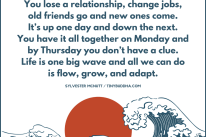
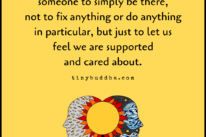


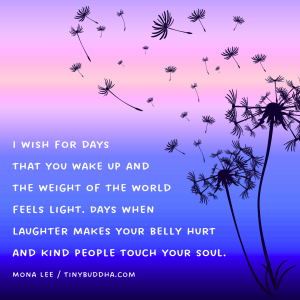
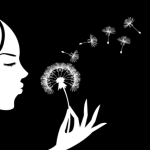




 Though I run this site, it is not mine. It's ours. It's not about me. It's about us. Your stories and your wisdom are just as meaningful as mine.
Though I run this site, it is not mine. It's ours. It's not about me. It's about us. Your stories and your wisdom are just as meaningful as mine.